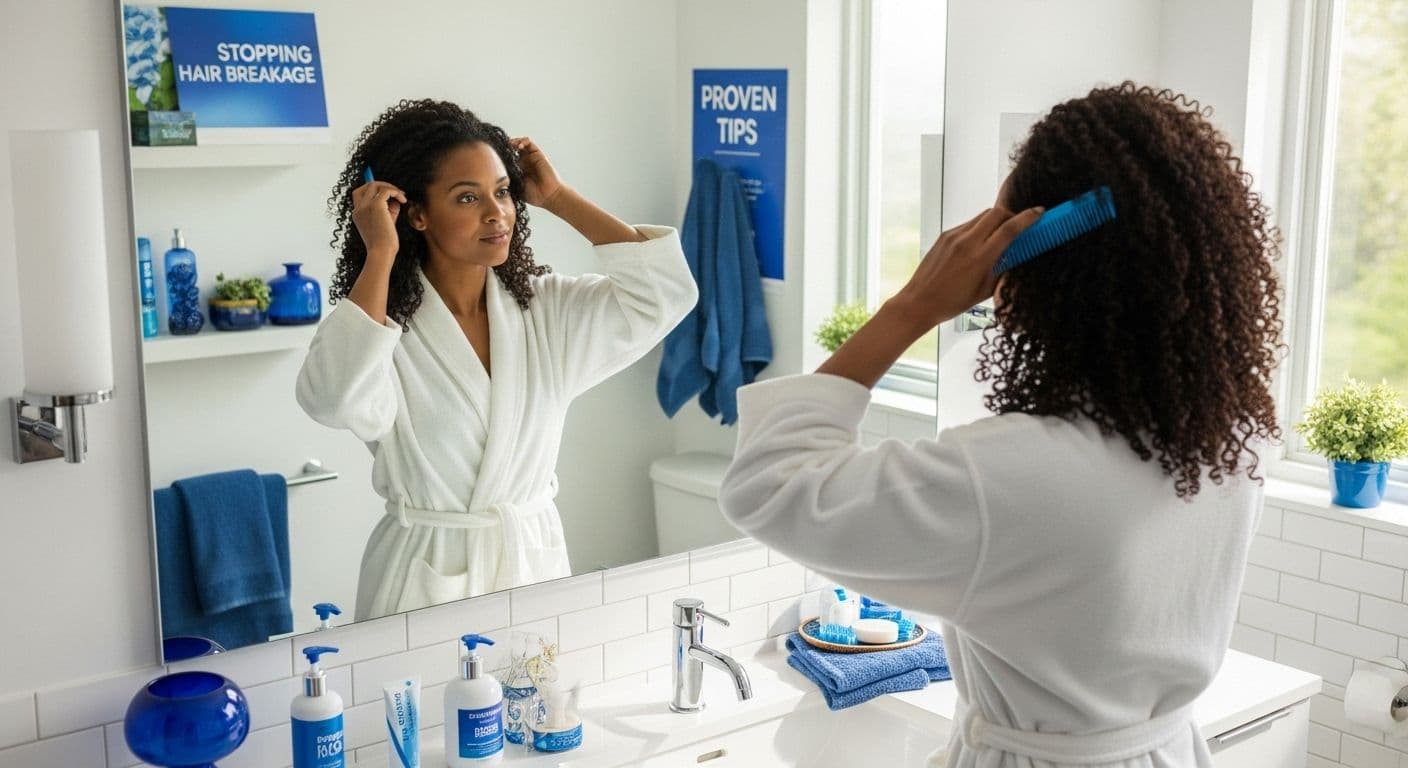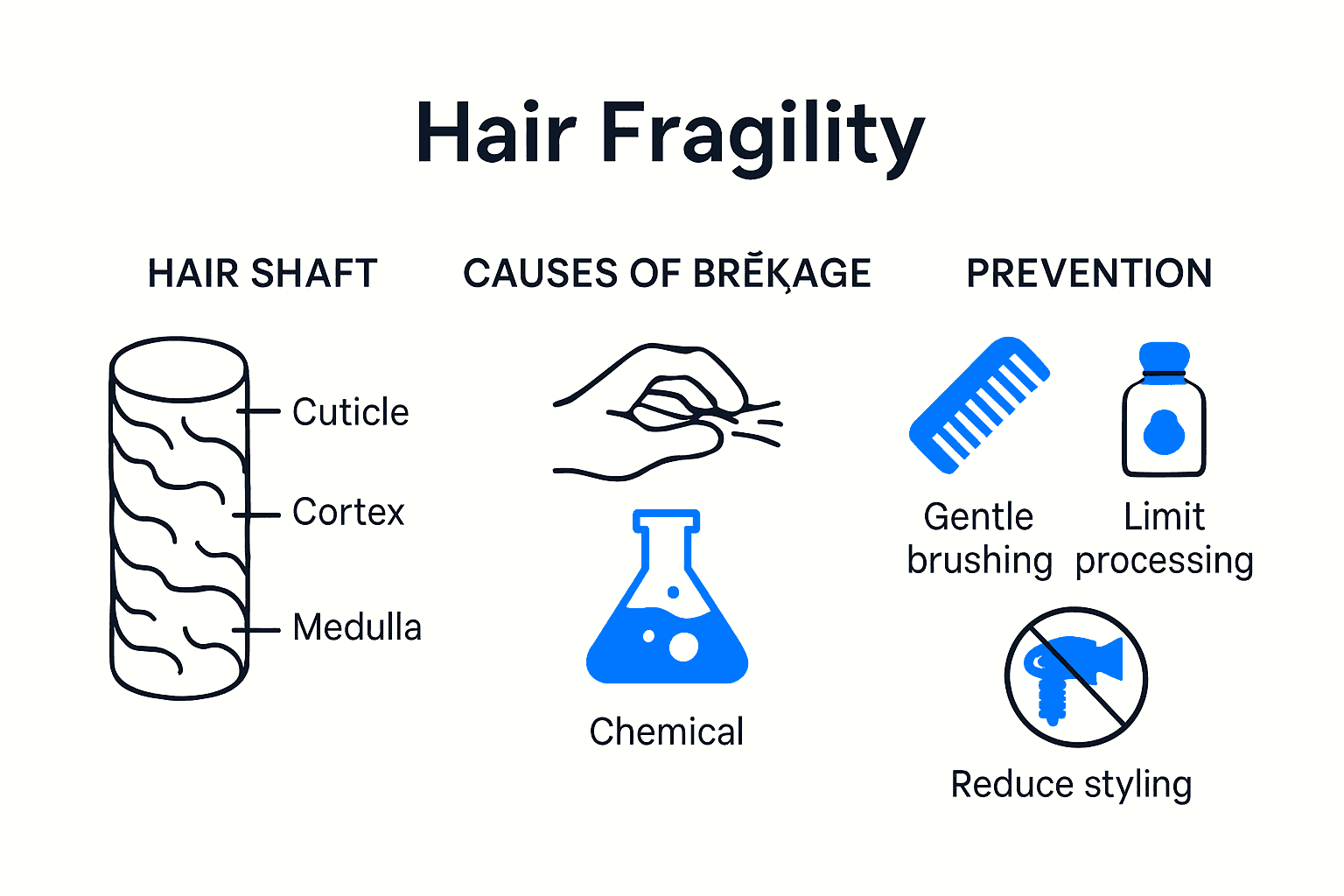Blog
Learning Materials
Stopping Hair Breakage: Proven Tips for Healthier Hair 2025
Updated: August 2, 2025

Hair breakage frustrates millions every year and leaves even the healthiest routines looking dull. Yet research shows that over 80 percent of breakage is caused by everyday habits, not just genetics or age. So many people blame their hair type when the truth is a few small changes in daily care can make hair noticeably stronger and prevent future splits. Prepare to rethink everything you thought you knew about stopping hair breakage.
Table of Contents
- Understanding Why Hair Breakage Happens
- Effective Daily Habits For Stopping Hair Breakage
- Best Products And Treatments That Really Work
- Personalized Hair Care Tips For Lasting Results
Quick Summary
| Takeaway | Explanation |
|---|---|
| Handle hair gently to prevent breakage. | Minimize mechanical stress by using wide-toothed combs and soft hair ties, especially when hair is wet. |
| Maintain a balanced diet for hair health. | Incorporate protein and essential vitamins to strengthen hair from within and help reduce fragility. |
| Choose appropriate hair care products. | Use sulfate-free shampoos and conditioners with protein to enhance hair strength and moisture retention. |
| Personalize your hair care routine. | Identify your specific hair type and adapt care strategies to effectively prevent breakage and support hair health. |
| Consider professional treatments for intensive care. | Regular professional deep conditioning and specialized treatments can significantly repair and protect hair. |
Understanding Why Hair Breakage Happens
Hair breakage is a complex issue that impacts millions of people worldwide, creating frustration and challenges in maintaining healthy hair. Understanding the root causes of hair breakage is crucial for developing effective prevention and treatment strategies.
The Science Behind Hair Structure and Damage
Hair is composed of a protein called keratin, structured in three primary layers: the cuticle, cortex, and medulla. Research from the National Institutes of Health reveals that the outermost cuticle layer acts as a protective shield, and when this layer becomes compromised, hair becomes significantly more vulnerable to breakage.
The structural integrity of hair depends on multiple factors. External environmental conditions, chemical treatments, and mechanical stress can gradually erode the protective cuticle layer. Microscopic damage accumulates over time, creating weak points along the hair shaft that eventually lead to breakage.
Common Causes of Hair Fragility
Multiple interconnected factors contribute to hair breakage. Dermatological research identifies several primary contributors:
- Mechanical Stress: Aggressive brushing, tight hairstyles, and frequent use of hair accessories create repeated tension that weakens hair strands.
- Chemical Processing: Repeated bleaching, coloring, and chemical straightening treatments strip hair of its natural protective proteins.
- Heat Damage: Frequent use of flat irons, curling wands, and blow dryers at high temperatures can fundamentally alter hair's protein structure.
Genetic predispositions and underlying health conditions also play significant roles in hair vulnerability. Nutritional deficiencies, hormonal imbalances, and certain medical treatments can dramatically impact hair strength and resilience.
Prevention and Holistic Hair Health

Addressing hair breakage requires a comprehensive approach. Understanding your specific hair type, adopting gentle hair care practices, and protecting hair from environmental stressors are critical strategies. Learn more about repairing damaged hair to develop a personalized hair care routine that minimizes breakage and promotes long-term hair health.
By recognizing the intricate mechanisms behind hair fragility, individuals can make informed decisions about hair care, ultimately reducing breakage and maintaining stronger, more resilient hair.
To help visualize the main causes of hair breakage, the following table summarizes the different contributing factors and their effects on hair:
| Cause | Description | Effect on Hair |
|---|---|---|
| Mechanical Stress | Aggressive brushing, tight hairstyles, use of accessories | Weakens and snaps hair strands |
| Chemical Processing | Bleaching, coloring, straightening strips protective proteins | Increases porosity and fragility |
| Heat Damage | Flat irons, curling wands, blow dryers at high temperatures | Alters protein structure, dryness |
| Genetics/Health | Nutritional deficiencies, hormonal imbalances, medical treatments | Reduces hair strength/resilience |
Effective Daily Habits for Stopping Hair Breakage
Preventing hair breakage requires consistent and mindful daily practices that protect and nourish your hair from root to tip. Implementing strategic habits can significantly reduce damage and promote stronger, more resilient hair strands.
Gentle Hair Handling Techniques
According to the American Academy of Dermatology, how you handle your hair matters dramatically in preventing breakage. Start by minimizing mechanical stress through gentle handling. When hair is wet, it's most vulnerable, so use a wide-toothed comb instead of a brush to detangle, working from ends to roots with minimal pulling.
Avoid tight hairstyles that create constant tension on hair follicles. Elastic bands with metal clasps can snag and break hair, so opt for soft scrunchies or fabric hair ties that reduce friction. Protective styling during sleep and high-activity periods can also prevent unnecessary strain.
Nutrition and Hair Health Fundamentals
Harvard Health emphasizes that nutrition plays a critical role in hair strength. B vitamins like biotin, riboflavin, and thiamin are essential for maintaining hair's structural integrity. Incorporate protein-rich foods, omega-3 fatty acids, and foods containing zinc and iron to support hair health from within.
A balanced diet directly influences hair's ability to resist breakage. Consider supplementing with vitamins if your diet lacks essential nutrients, but always consult a healthcare professional first. Hydration is equally important drinking adequate water helps maintain hair's moisture balance and reduces brittleness.
Smart Hair Care Routine Strategies
The Centers for Disease Control and Prevention highlights the importance of proper scalp and hair hygiene. Develop a routine that minimizes damage by using sulfate-free shampoos, applying conditioner primarily to ends, and limiting heat styling.
When using heat tools, always apply a heat protectant and use the lowest effective temperature. Learn more about creating a comprehensive hair care routine that addresses your specific hair type and needs. Regular deep conditioning treatments can help restore moisture and strengthen hair against potential breakage.
By adopting these daily habits, you can transform your hair care approach, reducing breakage and promoting healthier, more resilient hair. Consistency and gentle treatment are key to maintaining hair strength and preventing unnecessary damage.
The following table summarizes daily habits and techniques for minimizing hair breakage, along with corresponding tips:
| Daily Habit | Description/Tip |
|---|---|
| Gentle Detangling | Use wide-toothed comb on wet hair, detangle from ends upward |
| Avoid Tight Hairstyles | Select soft scrunchies, avoid tight ponytails/buns |
| Sleep Protection | Use protective hairstyles, wrap hair, or use satin/silk pillowcases |
| Nutrition & Hydration | Eat balanced diet (protein, biotin, zinc), stay well-hydrated |
| Smart Product Use | Choose sulfate-free shampoo, protein conditioners, apply heat protectant |
| Limit Heat Styling | Use lowest temperature, reduce frequency of hot tool use |
| Regular Conditioning | Deep condition and moisturize ends weekly |
Best Products and Treatments That Really Work
Navigating the complex world of hair care products requires understanding which treatments genuinely address hair breakage and promote long-term hair health. Selecting the right products can make a significant difference in preventing damage and strengthening hair strands.
Scientifically Backed Nutritional Supplements
Research published in JAMA Dermatology reveals several nutritional supplements demonstrate promising results in supporting hair health. Supplements like Viviscal, Nutrafol, and pumpkin seed oil have shown potential in reducing hair breakage and promoting stronger hair growth.
Key supplements to consider include:
- Zinc
- Omega-3 and omega-6 fatty acids
- Biotin
- Vitamin B complex
However, it's crucial to consult with a healthcare professional before starting any supplementation regimen. Individual nutritional needs vary, and professional guidance ensures safe and effective treatment.
Advanced Hair Care Product Strategies
According to Johns Hopkins Medicine, selecting the right hair care products is critical in preventing trichorrhexis nodosa, a common cause of hair breakage. Look for products with specific characteristics:
- Shampoos with nonionic or amphoteric surfactants
- Conditioners containing protein to strengthen hair
- Leave-in treatments that provide additional moisture and protection
Discover personalized hair treatment recommendations tailored to your specific hair type and condition. Professional guidance can help you develop a targeted approach to stopping hair breakage.
Professional Treatments and Specialized Care
Harvard Health emphasizes that beyond products, comprehensive hair care involves understanding your unique hair needs. Professional treatments can provide intensive repair and protection:
- Deep conditioning treatments
- Keratin treatments
- Professional hair bonding treatments
- Scalp treatments that address underlying hair health issues
These specialized treatments work at a deeper level, repairing damaged hair structure and preventing future breakage. Professional hair care experts can assess your specific hair challenges and recommend targeted solutions.
Remember that no single product offers a universal solution. Successful hair breakage prevention requires a holistic approach combining proper nutrition, gentle hair handling, appropriate products, and professional guidance. Patience and consistency are key to achieving healthier, more resilient hair.
Personalized Hair Care Tips for Lasting Results
Every individual's hair is unique, requiring a tailored approach to prevent breakage and maintain optimal hair health. Understanding your specific hair type, texture, and personal lifestyle factors is crucial in developing an effective hair care strategy.
Identifying Your Hair's Specific Needs
The American Academy of Dermatology emphasizes the importance of recognizing your hair's individual characteristics. Hair texture, porosity, and scalp condition play significant roles in determining the most appropriate care routine. Hair diagnostic tools can help you understand your hair's specific requirements, allowing for more targeted treatment approaches.
Assess your hair's unique properties:
- Hair thickness (fine, medium, thick)
- Scalp condition (oily, dry, balanced)
- Hair porosity (low, medium, high)
- Natural hair pattern (straight, wavy, curly, coily)
Customized Protection Strategies
Health Centre NZ highlights that protective strategies must be tailored to individual hair types. For those with delicate or prone-to-breakage hair, implementing specialized protection techniques becomes crucial. This includes selecting appropriate hair accessories, developing gentle detangling methods, and creating a personalized nighttime hair care routine.
Key personalized protection strategies include:
- Silk or satin pillowcases to reduce friction
- Custom-designed protective hairstyles
- Individualized detangling techniques
- Nighttime hair wrapping methods specific to your hair texture
Adaptive Hair Care Routine Development
Health Research Policy recommends an adaptive approach to hair care that evolves with your hair's changing needs. Factors such as seasonal changes, hormonal shifts, and lifestyle modifications can significantly impact hair health.
Explore our comprehensive guide to developing a personalized hair care routine that addresses your unique hair challenges. Consider these adaptive strategies:
- Quarterly hair health assessments
- Seasonal routine adjustments
- Tracking hair response to different products and treatments
- Flexible conditioning and treatment approaches
Successful hair care is not about following a one-size-fits-all approach, but about understanding and responding to your hair's unique characteristics. Patience, consistent observation, and willingness to adapt are key to preventing hair breakage and maintaining long-term hair health. By developing a personalized strategy that considers your individual hair type, lifestyle, and environmental factors, you can achieve stronger, more resilient hair.

Frequently Asked Questions
What causes hair breakage?
Hair breakage is commonly caused by mechanical stress from aggressive brushing, tight hairstyles, chemical processing, and heat damage. Environmental factors and genetics can also contribute to hair fragility.
How can I prevent hair breakage?
To prevent hair breakage, handle hair gently using wide-toothed combs and soft hair ties, maintain a balanced diet rich in protein and vitamins, and use sulfate-free shampoos and conditioners designed to strengthen hair.
Are there specific products that help reduce hair breakage?
Yes, look for shampoos with nonionic or amphoteric surfactants, protein-rich conditioners, and leave-in treatments that provide moisture. Nutritional supplements like biotin and omega-3s also support hair health.
How often should I deep condition my hair to prevent breakage?
It's advisable to deep condition your hair at least once a week. This helps restore moisture and strengthen hair, making it more resilient against breakage.
Ready for Stronger, Healthier Hair? Reveal the Secret Behind Lasting Results
If you have tried every "proven tip" for stopping hair breakage but still see splits and fragile strands, you are not alone. Most solutions skip over the most important fact: Everyone's hair has its own needs, and breakage often comes from what you cannot see. In this article, you learned how small daily habits, hair structure, and nutrition affect your hair's vulnerability. Yet, knowing what to change can feel overwhelming when your hair still seems to break.

Take control now with a truly personalized solution. With MyHair.ai, you can upload a quick scan, let AI technology analyze your specific hair patterns, and get instant recommendations designed specifically for your unique hair type. See how your hair health changes in real time and get science-backed product picks to support stronger, more resilient growth. If you are tired of guessing and ready to break the cycle for good, start your personalized hair assessment today. See what tailored care can do—your healthiest hair is only a click away.
Recommended
- How to Fix Hair Breakage: Proven Solutions for 2025 | MyHair
- Healthy Hair Routine 2025: Proven Steps for Stronger, Fuller Hair | MyHair
- Best Natural Remedies for Damaged Hair: 2025 Guide | MyHair
- Healthy Hair Care Routine 2025: Grow Stronger, Fuller Hair | MyHair
- Are You Accidentally Aging Yourself? – Heart N Soul Beauty